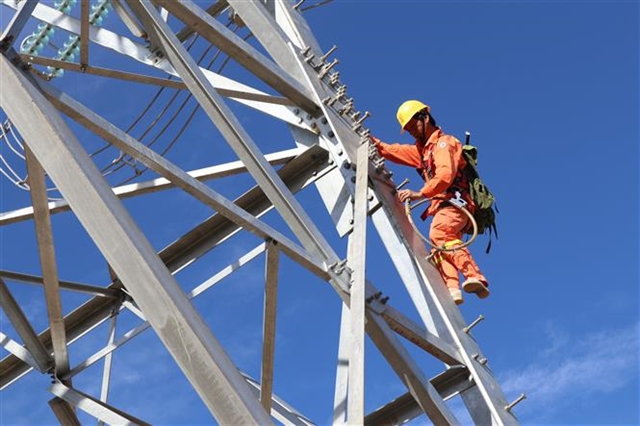 Economy
Economy


|
| The Việt Nam Electricity (EVN) asks to adjust electricity prices soon to offset rising input costs. — VNA/VNS Photo Huy Thành |
HÀ NỘI — The Việt Nam Electricity (EVN) has written to the Prime Minister and ministries, asking to adjust electricity prices to offset rising input costs.
At the conference to review work in 2022 and deploy tasks in 2023 on Wednesday, Nguyễn Tài Anh, Deputy EVN's General Director, said: "The retail price of electricity has been kept stable for nearly four years, while the price of fuel for electricity production and the exchange rate have both increased sharply."
Anh said: "It makes it difficult for EVN to balance its finances, and EVN suffered heavy losses in 2022."
Overall, he said EVN's total revenue in 2022 was estimated at VNĐ460.7 trillion (US$20.03 billion), up 4.31 per cent compared to 2021, of which parent company EVN's revenue was estimated at VNĐ385.3 trillion, 101 per cent of the plan and up 11.28 per cent compared to that of 2021.
Anh informed the whole corporation's budget payment in 2022 was estimated at VNĐ22.5 trillion.
As the group estimated a loss of VNĐ31.36 trillion, EVN has reported to the Government, the Committee for Management of State Capital at Enterprises and Ministries, to allow the adjustment of electricity prices as early as in 2022 to reduce difficulties and possibly balance EVN's finances in the coming years.
Trần Đình Nhân, General Director of EVN, said the group had ensured electricity supply to serve the country's socio-economic development and people's lives, especially ensuring safe and stable electricity supply for important events in the country.
At the same time, it has implemented thrift and minimised costs to reduce losses, adding the total amount that EVN has implemented to reduce the overhead costs was VNĐ33.445 trillion.
Nhân said: "If EVN does not apply cost-saving solutions, the loss in 2022 may reach nearly VNĐ65 trillion."
Nhân said the financial imbalance could lead to the risk that EVN will not have a source of costs to operate, creating a risk of not being able to pay electricity sellers in the near future. Accordingly, Nhân said the credit rating coefficient of EVN will be underestimated, making it extremely difficult to get bank loans for power construction investment projects.
Nhân said: "This situation will greatly affect the energy security of the country."
Addressing the reality of power system operation in the context of high fuel prices, Nguyễn Đức Ninh, Director of the National Load Dispatch Center (A0), said that the lack of coal for power production in March and April had affected the power system, adding the unmobilised coal-fired power capacity was up to 3,000-4,000 MW. Meanwhile, in the South, the gas supply decreased by up to 70 per cent, so it was forced to mobilise high-priced power sources such as DO oil.
Ninh said: "The exploitation of hydroelectricity is only 36 per cent; coal power and renewable energy accounts for a large proportion, making electricity costs high. Previously, the average coal price was about $140 per tonne, but now it has increased to $400 per tonne. The average retail price of electricity according to current regulations was VNĐ1,864 per kWh, but the variable price of power plants was more than VNĐ2,000 per kWh, even totalling up to nearly VNĐ4,000 each."
Lê Văn Đanh, General Director of Power Generation Corporation 3, said in the first and second quarters of this year, the price of imported coal increased by 4.2 times compared to 2020 and 2.2 times to 2021. In addition, the exchange rate also has strong fluctuations, he said.
"There was a time when the exchange rate loss was VNĐ2.6 trillion, while the production value was only VNĐ3 trillion, now the exchange rate is decreasing but not significantly," said Đanh.
Nguyễn Hoàng Anh, Chairman of the Committee for Management of State Capital at Enterprises, said that EVN's loss of more than VNĐ31 trillion was remarkable.
Anh has proposed to EVN to reduce operating costs further and asked the Government to adjust electricity prices, saying: "Electricity prices must be calculated cyclically, to have drastic proposals to increase prices according to the market when input increases. The units set annual targets, so why don't we do it."
EVN considered tasks in 2023 were quite heavy; therefore, to implement them and ensure the excellent performance of the power supply task, EVN's leaders proposed the Prime Minister soon consider and approve the Electricity Master Plan VIII, approve the amendment of Decision 28/2014 Regulations on the structure of retail electricity tariff.
At the same time, EVN also proposed the Ministry of Industry and Trade approve and adjust the average retail price of electricity according to the provisions of the Prime Minister's Decision 24/2017/QĐ-TTg on the average retail price of electricity.
It also asked the Government for a market mechanism for electricity activities, promptly adjusting electricity prices when input factors change to reduce difficulties for the corporation. — VNS